-
 +13 +2
+13 +2The shift to a green energy future is renewing plantation-era water wars in Hawaii
Wesley Yadao, 71, farms five acres of taro in a region of Kauai where generations of families have tended the starchy root vegetable in wet paddies fed by the Waimea River. His tough-knuckled hands betray the necessity of a strong work ethic, an indelible link to his great-grandparents who planted the first seeds of the family’s taro-farming legacy.
-
 +2 +1
+2 +1USDA Announces $29 Million to Increase American-Made Fertilizer Production
ORLANDO, Fla., March 10, 2023 – U.S. Department of Agriculture (USDA) Secretary Tom Vilsack today announced that the Department received $3 billion in applications from more than 350 independent businesses from 47 states and 2 territories for the first two rounds of a new grant program to add innovative domestic fertilizer production capacity.
-
 +3 +1
+3 +1How a shipping error 100 years ago launched the $30 billion chicken industry
The accidental origins of the chicken on your plate, explained.
-
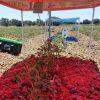 +19 +4
+19 +4Researchers find a more sustainable way to grow crops under solar panels
Researchers say they have determined a way to make agrivoltaics — the process of growing crops underneath solar panels — more efficient. They found that red wavelengths are more efficient for growing plants, while the blue part of the spectrum is better for producing solar energy. Solar panels that only allow red wavelengths of light to pass through could enable farmers to grow food more productively while generating power at the same time.
-
 +30 +5
+30 +5US farmers win right to repair John Deere equipment
The grassroots movement has grown among consumers around the world as repair costs soar.
-
 +16 +4
+16 +4US Farmers win right to repair John Deere equipment
Tractor maker John Deere has agreed to give its US customers the right to fix their own equipment. Previously, farmers were only allowed to use authorised parts and service facilities rather than cheaper independent repair options. Deere and Co. is one of the world's largest makers farming equipment.
-
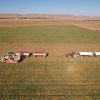 +20 +1
+20 +1U.S. agriculture agency extends climate funding to small farmers
The U.S. Department of Agriculture will distribute an additional $325 million in funding for projects tailored to smaller-scale farmers to reduce their greenhouse gas emissions, taking its total annual investment in climate-friendly farming to more than $3 billion, the agency announced Monday.
-
 +13 +2
+13 +2Three’s a crowd: how farmers are cutting out the supermarkets
Giving up police work to grow passion fruit might be considered an unconventional career move, but that is what Sergio Quijada Domínguez did when a hereditary heart condition forced him to retire at the age of 32 after 14 years in Spain’s Guardia Civil. Quijada, who has about 1,500 plants on his farm near Vélez-Málaga in southern Spain, found he was good at growing passion fruit – what he lacked was the knowhow to sell them.
-
 +12 +1
+12 +1Western Farmers Are Strapped for Water. These Technologies May Help.
Amid a historic drought and a rising population, new devices and approaches can help ease the strain on water resources for agriculture.
-
 +22 +3
+22 +3Superbug fight 'needs farmers to reduce antibiotic use'
Health and animal welfare campaigners concerned about the spread of superbugs in humans are calling for a ban on the overuse of antibiotics in farm animals. They say routinely using antibiotics in livestock can lead to bacteria becoming resistant and such 'superbugs' could spread to humans.
-
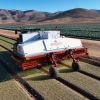 +22 +3
+22 +3This new farming robot uses lasers to kill 200,000 weeds per hour
In February, agricultural robotics company Carbon Robotics unveiled its 2022 LaserWeeder implement, a cost-effective weed control solution for large-scale specialty row crops.
-
 +15 +2
+15 +2Domestication History of Bananas is More Complex Than Previously Thought
New research led by the global research-for-development organization Bioversity International confirms that the genomes of today’s domesticated banana varieties contain traces of three extra, as yet unknown, ancestors.
-
 +13 +3
+13 +3New Zealand angers its farmers by proposing taxing cow burps
New Zealand's government on Tuesday proposed taxing the greenhouse gasses that farm animals make from burping and peeing as part of a plan to tackle climate change. The government said the farm levy would be a world first, and that farmers should be able to recoup the cost by charging more for climate-friendly products.
-
 +15 +2
+15 +2The future of agriculture: Artificial intelligence gives ranchers an extra eye on their herds
BETSY, short for Bovine Expert Tracking And Surveillance, is an Alberta-developed app that uses facial recognition cameras on livestock. If the app detects strange behaviour, it will alert the user.
-
 +12 +4
+12 +4‘Green gold’: Spanish farmers ditch olives for pistachios in bid to survive
Hard-up producers replace wheatfields and vineyards with a more lucrative, drought-resistant crop
-
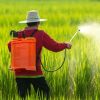 +21 +2
+21 +2World's Most Popular Herbicide Causes Dramatic Convulsions in Worms
The notorious weed-killer, Roundup, originally made by Monsanto and acquired by Bayer, has been found to cause seizure-like convulsions in roundworms.
-
 +16 +1
+16 +1Why there's no 'Dijon' in Dijon mustard
France is facing a widespread dearth of Dijon mustard, which news outlets wasted no time in attributing to the war in Ukraine. But the story is a whole lot spicier than that.
-
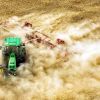 +24 +3
+24 +3A New Jailbreak for John Deere Tractors Rides the Right-to-Repair Wave
A hacker has formulated an exploit that provides root access to two popular models of the company’s farm equipment.
-
 +4 +1
+4 +1Self-driving tractors rolling out in California could fuel the future of farming
Some California farmers are going a little greener by opting for eco-friendly tools and transitioning to electric-powered, driverless, tractors. The company rolling these high-tech tractors out, Monarch Tractor, says this can help farmers save money, increase production, and help with the agriculture industry's growing labor shortage.
-
 +12 +3
+12 +3Hear me out – we could use the varroa mite to wipe out feral honey bees, and help Australia's environment
The varroa mite’s arrival in Australia was only a matter of time. We could benefit from one pest fighting another.
Submit a link
Start a discussion




















